June 21, 2025 | 03:50 GMT +7
June 21, 2025 | 03:50 GMT +7
Hotline: 0913.378.918
June 21, 2025 | 03:50 GMT +7
Hotline: 0913.378.918
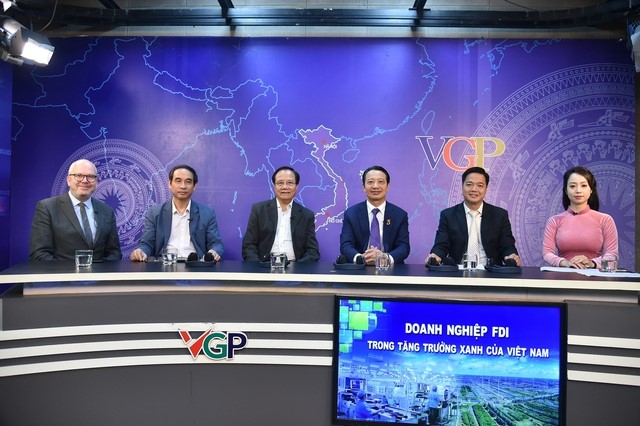
Seminar themed "FDI enterprises in Vietnam’s green growth”. Photo: VGP.
On April 27, the Government Portal held a seminar on "FDI enterprises in Vietnam’s green growth ". The seminar aimed to assess the contributions of foreign direct investment (FDI) enterprises to Vietnam's green growth strategy as well as discuss solutions and steps in the coming time to promote more in the process of achieving this goal. In which the agricultural sector assumes an important role in neutralizing carbon and combating climate change.
According to Mr. Dao The Anh, Deputy Director of the Vietnam Academy of Agricultural Sciences (Ministry of Agriculture and Rural Development, MARD), right from the beginning of 2022, MARD has issued the sector’s green growth action plan according to the government’s Green Growth Strategy. In this plan, the agricultural sector is well aware of the tasks, roles, and responsibilities for Vietnam's overall green growth.
In the past, in the face of negative impacts from economic recession, epidemics, and climate change, Vietnam's agriculture industry has still asserted itself to be the pillar of the economy and the premise for industrialization and modernization, playing an important factor in stabilizing the country. The industry has also achieved impressive export achievements, affirming the supporting role of the economy.
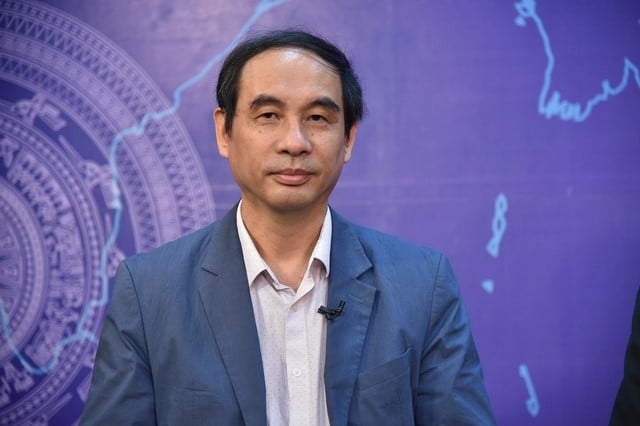
Mr. Dao The Anh, Deputy Director of the Vietnam Academy of Agricultural Sciences (VAAS). Photo: VGP.
However, Mr. Dao The Anh also assessed that the agricultural sector has not rationally used land and water resources, causing land and water resource pollution and impacting forest cover. Therefore, in the action plan, MARD has determined that in the next 10 years, the sector’s growth rate will be around 2.5–3% while still ensuring food security, nutrition security, hunger eradication, and poverty alleviation for all Vietnamese people.
At the same time, reducing soil pollution, improving soil health, enhancing biodiversity conservation, and saving water. Especially facing the challenges of climate change, water resources will become extremely scarce, so agricultural intensification will also have to change, including planning planting and farming areas in a scientific and reasonable way.
It is noticed that the agricultural sector has a lot of potential for investment in forest areas and agroforestry, forming "carbon sinks", which play a very important role in neutralizing the environment. Therefore, in order to promote this issue, what needs to be done now is to promote access to credit item markets suitable for agriculture and rural areas.
Besides businesses, there are also two very important main production forces: cooperatives and smallholder farmers. The reform of the agricultural extension apparatus is thus extremely important. In which community agricultural extension, together with media programs on green development, ecological agricultural production, and sustainable consumption, can ensure the carbon neutrality of the agricultural sector
In response to new development requirements, Vietnam has shown its determination to promote the "greening" of the economy. At COP26, Vietnam made a commitment to achieve net zero emissions by 2050. Accordingly, the Prime Minister has promulgated the National Strategy on Green Growth in the 2021–2030 period, with a vision to 2050, and the National Action Plan on Green Growth in the 2021–2030 period. Achieving these goals requires the participation of all economic sectors, in which the contribution of FDI enterprises is extremely important.
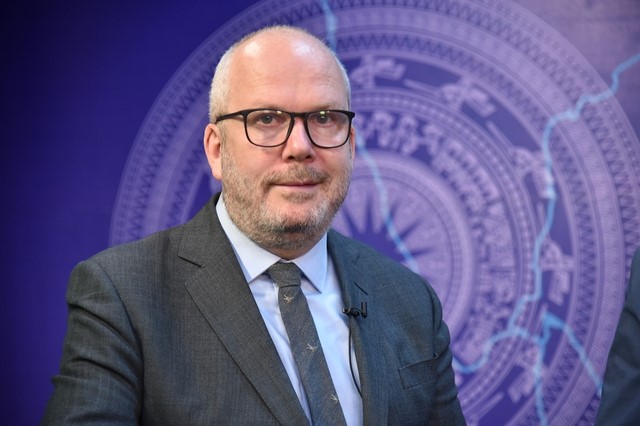
Mr. Chris Hogg, Vice President and Director of Sustainability and Communications for Asia, Oceania, and Africa, Nestlé Group. Photo: VGP.
Attending the seminar, Mr. Chris Hogg, Vice President and Director of Sustainability and Communications for Asia, Oceania, and Africa at Nestlé Group, agreed that private businesses should take responsibility for implementing green goals.
Nestlé Group has encouraged and mobilized 600,000 farmers around the world to apply regenerative agriculture technologies and have solutions to adapt to climate change, reduce carbon emissions, and improve soil quality through the atmosphere’s absorption process.
"Thanks to the methods, we will promote sustainability in the entire production process, in the process of increasing labor productivity and prioritizing health issues, helping farmers to increase their productivity and efficiency while minimizing the use of chemicals in production," said Mr. Chris Hogg.
Mr. Nguyen Quang Vinh, Vice Chairman of VCCI and Chairman of the Business Council for Sustainable Development in Vietnam, said, “When talking about green growth, let's look at the green race that is taking place quietly but fiercely among countries in the world and among countries in the region.
We see that a green race has been smoldering for 2-3 decades in Asia and Europe, but in Asia, Korea, Japan, and others are emerging. Especially China, after paying the price with very expensive lessons on economic growth in all ways. Currently, China is the world's leading country in terms of investment in green growth, green finance, public health, green technology, and many more sources. This is a green race. And business plays a very important role."
"Green" here is thus not just about businesses but about science and technology. Therefore, the FDI business community investing in Vietnam needs to select and provide criteria to invest in the most advanced science and technology to reduce greenhouse gas emissions, in line with the Prime Minister's commitment to reduce emissions to zero in 2050.
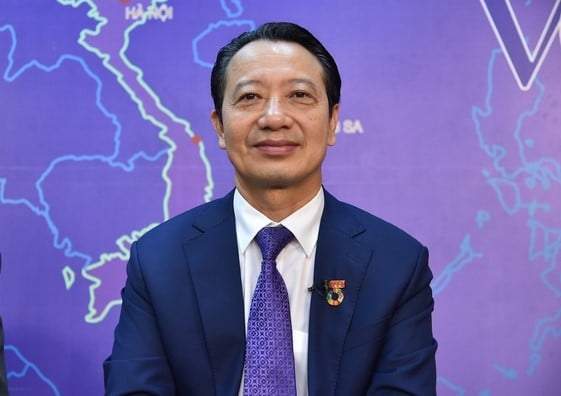
Mr. Nguyen Quang Vinh, Vice Chairman of the VCCI. Photo: VGP.
The Vice Chairman of VCCI also said: It is necessary to have a path to implement green growth. In this unpredictable context, it is more difficult to implement the green growth strategy, especially since we are not a rich country but just a developing country.
It's time for the business community to look back and reflect on these strategies, especially this green growth strategy, to reposition their values, not just for the role but also for the businesses themselves if they implement a green growth strategy.
The trend of green growth has become an inevitable choice and a goal that every country is aiming for. This is a new approach to economic growth, towards harmonious socio-economic development with restoration and conservation of natural ecosystems.
Prime Minister Pham Minh Chinh has repeatedly emphasized asking international partners and investors to support Vietnam in policy advice, human resource training, administration capacity improvement, technology research and application, and especially capital support at a reasonable cost so that the process of transforming and greening Vietnam's economy ensures fairness and justice when Vietnam is a developing country with a transforming economy but commits to and performs climate change response tasks like developed countries.
Translated by Huyen Vu Thu
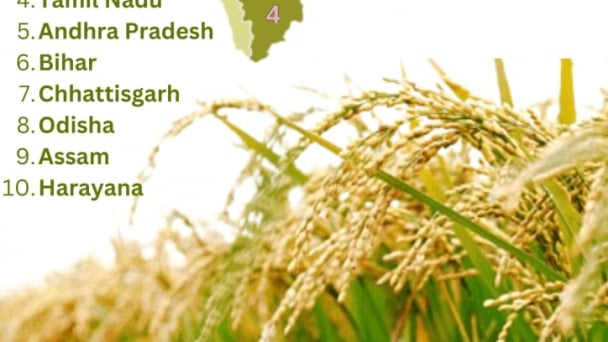
(VAN) Last week, the U.S. Department of Agriculture (USDA) released its June World Agricultural Supply and Demand Estimates (WASDE), raising projections for both Indian rice production and U.S. rice imports for the 2025/2026 marketing year.
/2025/06/17/2344-1-131758_261.jpg)
(VAN) Amid tariff risks and growing trade barriers in the U.S. market, Australia is emerging as a promising destination to sustain the growth momentum of Vietnam's shrimp exports.
/2025/06/17/2013-1-nongnghiep-112009.jpg)
(VAN) This notable growth trend reflects the global taste for fresh, nutritious fruits and the expanding use of lychees across various sectors.

(VAN) The political and cultural insulation of Japan’s beloved grain is falling apart, and experts warn the country’s relationship with the staple will have to adapt.

(VAN) Noting risks, report examines impacts of avian influenza, changing trade patterns since 2022, fish fraud, and shipping industry’s net-zero goals.

(VAN) Mr. Tran Quang Bao, General Director of the Forestry and Forest Protection Department, met and worked with the International Wood Products Association to promote cooperation in the field of timber trade.

(VAN) China's outbound shipments of rare earths in May jumped 23% on the month to their highest in a year, though Beijing's export curbs on some of the critical minerals halted some overseas sales.